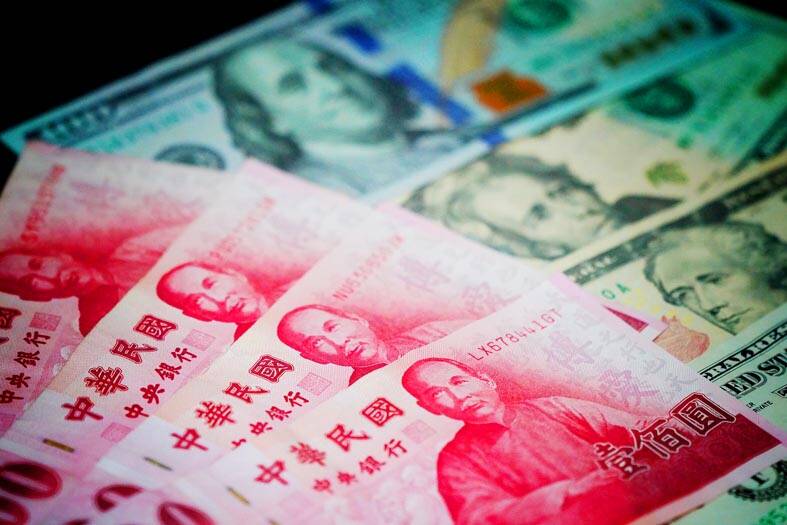The nation’s biggest banks are stepping up efforts to draw deposits from individuals and companies, responding to regulator demands for them to reduce a key ratio tracking their exposure to the nation’s hot housing market.
Multiple bank employees told Bloomberg News that domestic lenders are aggressively seeking both New Taiwan dollars and foreign currencies.
Lenders are targeting institutions, including insurers and corporates, and retail investors to fulfill internal deposit targets, they said.

Photo: CNA
In August, central bank Governor Yang Chin-long (楊金龍) met officials from 34 banks to underscore concerns about the high property prices and the risks for banks.
Regulators asked for improvement plans to reduce the ratio of mortgages to deposits and debentures to well below the legal maximum of 30 percent, leaving the local banks, which have always been highly liquid, in the rare position of seeking more funds from depositors.
“The ratio at banks is likely to remain at a high level as property loans are an important income channel,” Fitch Ratings analyst Cherry Huang (黃嬿如) said.
The central bank has a “very conservative” regulatory stance, she said.
“As regulators are likely to still encourage banks to diversify loans, overseas advances may become more important for banks’ revenue,” she added.
Although it is unclear how long the phenomenon would last, the effort to curb the key ratio could slow lending and crimp profits as banks pay more for deposits.
About 15 banks had ratios above 27 percent at the end of October, with four more than 28 percent, Financial Supervisory Commission data showed.
On Friday last week, the nation’s banks took more than NT$40 billion (US$1.23 billion) of special time deposits, with one-month rates of up to 1.75 percent and three-month rates of 1.76 percent, central bank data showed.
On Monday, they took in more than NT$20 billion in special deposits. Special deposits are sometimes only available for a short period, and central bank data show many transactions of about NT$10 million, but deposits of NT$1 billion have been seen.
The central bank is scheduled to hold a board meeting tomorrow, with investors watching in case there are more real-estate-related credit curbs.
During its last meeting in September, the central bank unveiled its seventh round of credit controls to cool the property market, reducing the amount of money people can borrow for second homes. It also hiked the reserve requirement ratio by 25 basis points, acting for the second time this year to raise the amount banks must hold in reserve.
That is having some effect on transactions, with housing deals in October and last month for the six special municipalities the lowest since February, which was affected by the Lunar New Year holiday.

Taiwan Semiconductor Manufacturing Co (TSMC, 台積電) would not produce its most advanced technologies in the US next year, Minister of Economic Affairs J.W. Kuo (郭智輝) said yesterday. Kuo made the comment during an appearance at the legislature, hours after the chipmaker announced that it would invest an additional US$100 billion to expand its manufacturing operations in the US. Asked by Taiwan People’s Party Legislator-at-large Chang Chi-kai (張啟楷) if TSMC would allow its most advanced technologies, the yet-to-be-released 2-nanometer and 1.6-nanometer processes, to go to the US in the near term, Kuo denied it. TSMC recently opened its first US factory, which produces 4-nanometer

GREAT SUCCESS: Republican Senator Todd Young expressed surprise at Trump’s comments and said he expects the administration to keep the program running US lawmakers who helped secure billions of dollars in subsidies for domestic semiconductor manufacturing rejected US President Donald Trump’s call to revoke the 2022 CHIPS and Science Act, signaling that any repeal effort in the US Congress would fall short. US Senate Minority Leader Chuck Schumer, who negotiated the law, on Wednesday said that Trump’s demand would fail, while a top Republican proponent, US Senator Todd Young, expressed surprise at the president’s comments and said he expects the administration to keep the program running. The CHIPS Act is “essential for America leading the world in tech, leading the world in AI [artificial

REACTIONS: While most analysts were positive about TSMC’s investment, one said the US expansion could disrupt the company’s supply-demand balance Taiwan Semiconductor Manufacturing Co’s (TSMC, 台積電) new US$100 billion investment in the US would exert a positive effect on the chipmaker’s revenue in the medium term on the back of booming artificial intelligence (AI) chip demand from US chip designers, an International Data Corp (IDC) analyst said yesterday. “This is good for TSMC in terms of business expansion, as its major clients for advanced chips are US chip designers,” IDC senior semiconductor research manager Galen Zeng (曾冠瑋) said by telephone yesterday. “Besides, those US companies all consider supply chain resilience a business imperative,” Zeng said. That meant local supply would

Servers that might contain artificial intelligence (AI)-powering Nvidia Corp chips shipped from the US to Singapore ended up in Malaysia, but their actual final destination remains a mystery, Singaporean Minister for Home Affairs and Law K Shanmugam said yesterday. The US is cracking down on exports of advanced semiconductors to China, seeking to retain a competitive edge over the technology. However, Bloomberg News reported in late January that US officials were probing whether Chinese AI firm DeepSeek (深度求索) bought advanced Nvidia semiconductors through third parties in Singapore, skirting Washington’s restrictions. Shanmugam said the route of the chips emerged in the course of an